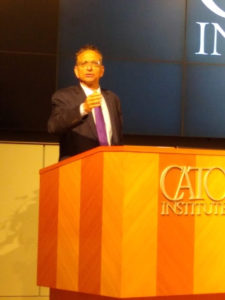The Score: Iran Sanctions, Religious Liberty, Amazing Grace, Virginia Demographics
This week on The Score – Do economic sanctions succeed as tools of foreign policy? Is religion good for liberalism or is liberalism good for religion? How did the Civil War change the patterns of Virginia’s population? Is the Trump administration’s Iran policy clever or catastrophic?
Economic Sanctions
We have a really packed show this week, including Tim Hulsey’s reviews of two family-friendly movies.
Let’s start with Doug Bandow, a senior fellow at the Cato Institute. He is the author of Beyond Good Intentions: A Biblical View of Politics (1988) and Foreign Follies: America’s New Global Empire (2006). Last week he wrote an article for The American Spectator headlined “The Problem with Sanctions: Feel Good Versus Effective Policy.” In it, he writes:
Sanctions can be a useful foreign policy tool. But economic warfare is no panacea. Indeed, so far the administration’s reliance on economic penalties has been a bust. They have proliferated without having any visible impact on the conduct of Cuba, Iran, North Korea, Russia, or Venezuela. Administration officials appear to be fulfilling the classic definition of insanity — doing the same thing while expecting a different outcome. The president needs to take control of his foreign policy and emphasize results over politics.
I asked him about sanctions policy on Wednesday afternoon in Washington, and also asked him to comment on the meeting in Vladivostok between Russian president Vladimir Putin and North Korean dictator Kim Jong Un. (Bandow is co-author, with Ted Galen Carpenter, of the 2004 book, The Korean Conundrum: America’s Troubled Relations with North and South Korea.)
Virginia’s Post-Civil War Population
 Using census records from the 1860s and 1870s, demographic researchers at the Weldon Cooper Center for Public Service at the University of Virginia have been exploring how Virginia’s population changed as a result of the Civil War. The results were not entirely what you might expect.
Using census records from the 1860s and 1870s, demographic researchers at the Weldon Cooper Center for Public Service at the University of Virginia have been exploring how Virginia’s population changed as a result of the Civil War. The results were not entirely what you might expect.
Using census age groups to predict Virginia’s 1870 population shows that the state would have been expected to experience another decade of steady growth, adding approximately 229,000 new residents. Economic trends at the beginning of the 1860s seem to support this. The Norfolk and Petersburg railway had just been completed, providing Virginia with a direct railroad connection to its largest ports. Meanwhile the Covington and Ohio railroad was being constructed through the Alleghany Mountains to connect eastern Virginia to western Virginia and to the Midwest beyond.
However, the 1860s turned out very differently from previous decades. Five years after the war ended, the 1870 census showed that Virginia and what is now West Virginia’s population had only increased by 71,000 residents during the 1860s, 157,000 (or 9 percent) fewer residents than expected in 1870. The Library of Virginia’s database of military deaths counted just under 33,000 Virginia soldiers who died in the war, but most of the 157,000 missing residents probably had left Virginia during the 1860s. Some of the missing residents were likely civilians who also died during the war, were soldiers who have not yet been counted, or were children that were never born because their parents died or were dislocated by the war.
I spoke to state demographer Hamilton Lombard about the study at his office in Charlottesville. We met on Thursday afternoon.
Religion and Liberalism
Last week the Cato Institute hosted a panel discussion on the question, “Is Liberalism Good for Religions?” The panel included Mustafa Akyol, Dan Philpott, Joe Loconte, and moderator Doug Bandow.
 Historian Joseph Loconte teaches at The King’s College in New York City. He is author of A Hobbit, a Wardrobe, and a Great War: How J. R. R. Tolkien and C. S. Lewis Rediscovered Faith, Friendship, and Heroism in the Cataclysm of 1914-1918 (2015); God, Locke, and Liberty: The Struggle for Religious Freedom in the West (2014); and Seducing the Samaritan: How Government Contracts Are Reshaping Social Services (1997). After the discussion, I pulled him aside to discuss the mutually nourishing relationship of religion and liberalism, and discovered we both have an institutional connection to the Ethics and Public Policy Center, where I worked for about eight years at the start of my career and where he was once a senior fellow.
Historian Joseph Loconte teaches at The King’s College in New York City. He is author of A Hobbit, a Wardrobe, and a Great War: How J. R. R. Tolkien and C. S. Lewis Rediscovered Faith, Friendship, and Heroism in the Cataclysm of 1914-1918 (2015); God, Locke, and Liberty: The Struggle for Religious Freedom in the West (2014); and Seducing the Samaritan: How Government Contracts Are Reshaping Social Services (1997). After the discussion, I pulled him aside to discuss the mutually nourishing relationship of religion and liberalism, and discovered we both have an institutional connection to the Ethics and Public Policy Center, where I worked for about eight years at the start of my career and where he was once a senior fellow.
Amazing Penguins
The Score’s film critic, Tim Hulsey, is back this week with a review of a couple of new documentaries: the long-awaited Amazing Grace, which records an Aretha Franklin concert of almost fifty years ago, and a new look at nature in Disney’s Penguins.
Amazing Grace, filmed under the direction of Sydney Pollack, was delayed because of technical difficulties in synchronizing visual and sonic elements (although the audio recording was released years ago). Penguins is the latest entry in Disney’s decades-long tradition of producing films about animals, both real and celluloid.
Iran Sanctions
 Earlier this week, the Trump administration announced hardline enforcement of economic sanctions aimed at Iran. Curt Mills wrote an analysis of the administration’s policy for The National Interest, saying in part:
Earlier this week, the Trump administration announced hardline enforcement of economic sanctions aimed at Iran. Curt Mills wrote an analysis of the administration’s policy for The National Interest, saying in part:
A former senior administration official close to Pompeo says that come 2024, the secretary will seek the presidency. Bolton and Pompeo remain allies but their interests are not congruent. As the perspicuous Thomas Wright of Brookings noted last year: “For Bolton, this is his last and best chance to achieve his ideological goal of demonstrating that the United States is free of legal and institutional constraints. For Pompeo it is a means to a bright political future.”
Indeed, daylight between the two was revealed in leaked comments over the weekend. “Let’s not beat around the bush,” Pompeo told a group of Iranian exiles in Texas, per Axios. “Ambassador Bolton spoke at an MEK rally. President Trump and I have not.”
Pompeo was, of course, alluding to the controversial People’s Mujahideen of Iran (MEK). The president’s lawyer, Rudolph Giuliani, told me last fall at an event affiliated with the MEK that the administration’s policy was effectively regime change.
I caught up with Mills by telephone on Thursday afternoon, when I also asked him about the Putin-Kim summit meeting in Russia.
Kafka’s California
We have previously spoken to attorneys at the Institute for Justice, a public interest law firm based in Arlington, Virginia, about their continuing efforts to defend the little guy against overreaching governments. Last week, I spoke by telephone to IJ attorney Josh House about a new case coming out of California. He explains the background about Ron Mugar’s dispute with the city of Norco and how allowing private attorneys to do government’s work is having unintended financial consequences for property owners and creating a moral hazard that leads to municipal corruption.
That’s the rundown for this week’s episode of The Score. If that’s not enough for you, be sure to come back next week — and if that’s not soon enough, tune in to 94.7 WPVC-FM in Charlottesville on Monday afternoon between 4 and 6 o’clock, where I’m part of a weekly round-table discussion about politics and current affairs.



